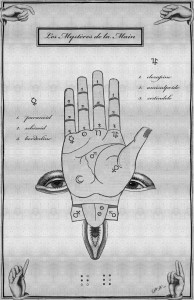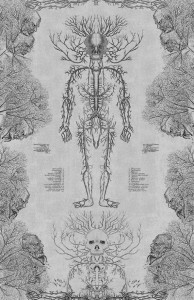Author Spotlight
Virtual Book Tour: Heather Fowler

Heather Fowler’s fourth collection of fiction speaks the language of need. Desperate, obsessive, even demented need—both emotional and erotic—is voiced by characters ill or ill-advised. From cyber to stalker, illicit, explicit, tender and tedious, the relationships in Elegantly Naked In My Sexy Mental Illness translate love and lust into disorder. How we hear our own need and the way it sounds to others proves in these enthralling stories an imperfect but utterly captivating conversation, a destructive yet dynamic discourse between well-being and disease, images and words.
Heather drops by HTMLGIANT to discuss the theme of mental illness in her new collection!
***
 Why I Wrote About Mental Illness:
Why I Wrote About Mental Illness:
I was inspired to write about mental illness due to many factors. Each story has a different question that caused its creation in my body of work. In hindsight, I think I meant this collection as a whole, due to its thematic connections, as an exploration of the psyche—a way to open up discussions about degrees of mental illness, as well as broadening readers’ minds with sympathy for those affected. As a sensitive person who has witnessed a lot of painful circumstances, I think I’ve always been curious about what causes unusual behaviors, erotic and otherwise.
When Sex and Love and Mental Illness Meet:
Elegantly Naked in My Sexy Mental Illness addresses human interaction more so than strictly defined mental illness. For example, in the real world, lovers are often perceived to be insane. It’s no wonder we have household terms like “crime of passion” and “temporary insanity,” but love’s insanity is one Elegantly Naked approaches from many angles but few labels. In one story called “Ever,” a character named Caroline Light is relentlessly pursued by a romantic stalker, and, due to the long duration of the stalking, she receives little to no continuous support from friends and family. What happens next? Her guard drops and she’s killed. Is her stalker a psychopath with malignant narcissism? A sociopath with a borderline personality? Perhaps, but I’m more interested in the effect on characters’ lives than specific diagnoses.
Disorders often have diagnostic overlap. Sometimes people carry a world of trauma in their heads, multiple issues. In the book as well, I have a piece called “The Gray Fairy” in which a young mentally ill character must be watched constantly. She hears voices—but also suffers the will to self-harm, anxiety attacks, dissociative disorder, depression, PTSD, and more. She’s a hard character to love with any security of reciprocity, but I explore the idea of her caretaker platonically attempting to get closer—until the dysfunctional home family dynamic forces the outsider out. There’s something fascinating and horrifying in that idea for me, the idea that those who harm can care more about protecting their reputations than exploring what ails their damaged daughter.
In another story, “His Other Women,” I explore a female narrator in love with a womanizer, whose inability to know whether she reads him correctly becomes an emotionally traumatizing spiral of self-induced doubt, abnormal thoughts, and paranoia: “But your cheating bastard has his claws in Clarissa, you know, you think…Sometimes, you imagine yourself and these women as a herd of sick sheep that oddly want to comfort one another. Sometimes, you want to make love to his women, every single one of them, so that you can enjoy the pleasure of taking what he has enjoyed.” She desires erotic transference, a shared state of reduced pain.
In each of these pieces, in different ways, I’m interested in causes of fracture in relationships and deviations from “normal.” I’m interested in the idea of psychotic breaks—the shifting balance of how perception impacts a construction of “sanity” that can change by the action or hour.
 Mentally Ill Doesn’t Mean Emotionally or Physically Bankrupt:
Mentally Ill Doesn’t Mean Emotionally or Physically Bankrupt:
I also liked the idea of depicting how a severely mentally ill individual could still be functional in many ways—because there are so many mentally ill people around us who function despite challenges. I think the generic term—“mental illness”—most often speaks to people’s visions of homeless people who rant and rave, serial killers on the news, and/or suicidal bridge-jumpers, the desperately affected, etc.
In my story “The Hand Licker,” the main character has early-onset, trauma-induced paranoid schizophrenia. He’s a poor little rich kid with an abusive father, who suffers visual and auditory hallucinations and often exhibits strange behaviors like licking women’s hands in public. This fictive story arose from a true story. In my piece, though, he’s a handsome guy, funny and endearing, a marvel in bed though he engages mostly in casual sex because he fears that he can’t get near lasting intimate partners because he won’t receive the respect he deserves when they realize he suffers something so debilitating. My piece shows him making a decision to be frank about his illness when he falls for a blind girl in the public library. In a sense, his discussion with her about his illness feels very safe—and she worries more about being alone in the world and whether he can cook than his persistent hallucinations. I’m at play, in this piece, with the concept of people with compatible weaknesses.
I’m glad to leave these characters in my story on a hopeful note, with a love in progress.
 A Shady History of the Treatment of the Mentally Ill:
A Shady History of the Treatment of the Mentally Ill:
Often, historically, the mentally ill have been the easiest population to violate because they have limited credibility in judicial and legal proceedings. I’m interested in issues of stigma and/or inhumane violations against those afflicted. My story “Taking Celine” is about this very thing.
It’s a historical piece set around the time of Silas Weir’s Rest Cure, where patients were often committed to sanatoriums and unable to get released without outside help.
Celine is a female patient routinely raped by her practicing therapist—and when the institution gets wind of this, instead of resolving the situation, it transfers the patient and the doctor. The doctor’s behavior is condoned; Celine’s rights are non-existent.
This piece is about the politics of power, masters and subordinates—but also about how the stigma of “mental illness” can create climates where civil rights are lost. That’s heartbreaking, really, though neither over nor new.
How Readers Respond to Portrayals of Mental Illnesses:
It gratifies me that many of the collection’s advanced reviewers found Elegantly Naked’s characters so real and sympathetic. As Ming Holden, author of The Survival Girls, notes, “Heather Fowler draws us into characters buzzing with internal lives that feel eerily familiar, as though she is showing us a piece of ourselves. What is chilling—and addictive—about her writing is how often those internal lives are ones of disorder.” Right. So many people, both normal and ill, have wildly disordered internal lives.
When this book begs the question of which is the case, I’m proud to have done something so complex. It means I have done my job as a writer, to have found sympathy and empathy for difficult situations. I’ve told a very hard thing to tell—I hope I have told it well.
You can purchase Heather’s book here!
***
 Heather Fowler is the author of the story collections Elegantly Naked In My Sexy Mental Illness; This Time, While We’re Awake; People with Holes; and Suspended Heart. Fowler’s work was named a 2012 finalist for Foreword Reviews Book of the Year Award in Short Fiction. She received her M.A. in English and Creative Writing from Hollins University. Her stories and poems have appeared in: PANK, Night Train, storyglossia, Surreal South, Feminist Studies, The Nervous Breakdown, and others. Please visit her website: www.heatherfowlerwrites.com
Heather Fowler is the author of the story collections Elegantly Naked In My Sexy Mental Illness; This Time, While We’re Awake; People with Holes; and Suspended Heart. Fowler’s work was named a 2012 finalist for Foreword Reviews Book of the Year Award in Short Fiction. She received her M.A. in English and Creative Writing from Hollins University. Her stories and poems have appeared in: PANK, Night Train, storyglossia, Surreal South, Feminist Studies, The Nervous Breakdown, and others. Please visit her website: www.heatherfowlerwrites.com
Tags: Heather Fowler, virtual book tour
